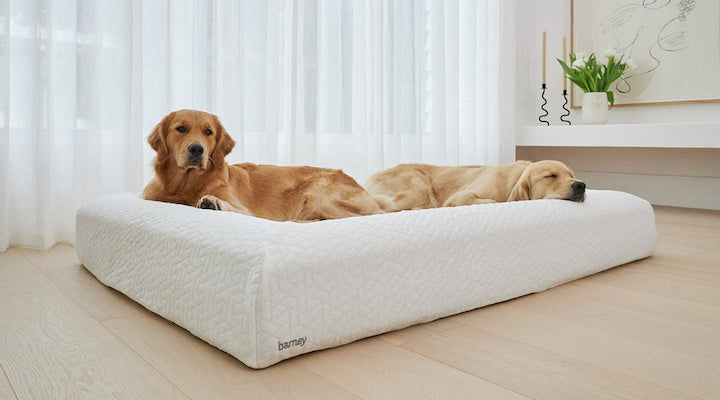Knockoffs, fakes, replicas and imitations have long held a place in retail but dupes and their growing acceptability on TikTok have taken consumer behavior to new heights. No product category appears to be safe with the existence of retailers dedicated to systematically ripping and profiting off popular designs, products and formulas. Sydney-based entrepreneur, Julia Sakr, founded the luxury dog-bed brand, Barney, one of the brands that was “duped” recently by multinational supermarket Aldi.
Aldi.
“I understand the desire for accessibility and affordability, however, as someone that puts a lot of effort into designing original products, I also see the challenges it presents first-hand, in terms of protecting my intellectual property and upholding the reputation of our brand,” Sakr told Inside Retail.
This is not the first time one of Sakr’s designs and innovations in pet care has been knocked off by a huge player – low-quality duplicates of Barney designs have been produced and stocked by the likes of Woolworths, Big W, Temu and Amazon.
Inside Retail spoke to Sakr to understand the side effects of being duped on small businesses and what it signals for the state of the retail industry at large.
When a knockoff goes viral
Sakr explained that she was first made aware of the Barney Bed dupe on TikTok after numerous accounts tagged her in a video showcasing Aldi’s dog bed. In the past, she said, she has chosen not to respond to alleged knock-offs, but this time, she asked for a response.
“I think people appreciate a small business taking on the giants on social media,” said Sakr.
“If nothing else it makes for a passionate thread of commentary, some negative but overwhelmingly positive,” she added.
In Sakr’s video responding to Aldi copying Barney’s overwhelmingly successful dog bed, she pointed out the dupe’s low quality, poor design and lack of function.
“Although the Aldi dupe looks very similar, it is extremely light and easy for dogs to latch on and pull apart. The fabric is thin and cheap and would not likely last a few washes,” said Sakr.
“The inner foam bolsters are not made from high-density memory foam like the Barney Bed is and the inner components of the bed lack any protective lining, so basically any accidents or dribble will seep right through,” she added.
Sakr makes room for consumers’ desire for accessible and affordable products but dupes present a conflict when trying to protect her intellectual property and uphold her brand’s reputation.
“Dupe culture leads people to feel entitled to buy original designs at a price they deem suitable without recognition of the investment and risk the original designer has taken,” she explained.
But Sakr’s conviction in her video response addressing the differences in design, which has now amassed over 300,000 views, generated a 300 per cent spike in sales, not only for Barney Bed but also her luxury cat-bed brand Street Cat.
All is not fair in retail and dupes
At this point, the dupe economy appears to be circular with retailers’ steady supply and consumers’ hungry demand.
“It’s not just multinationals in the business of ‘duping’, there are several Australian-based brands where we can trace back to purchases made by the founders who tried to directly copy our beds,” said Sakr.
Sakr shared that in some instances these brands’ disingenuousness goes well beyond duping, with some copycat founders not even owning a dog or regurgitating her founding story in an attempt to create the same sense of community and following that Barney has cultivated since launching in 2019.
“One such business, let’s call them ‘Lazy Dog’, bases their advertising on us, their ads read ‘up to 40 per cent cheaper than Barney’ which is flattering but misleading,” said Sakr.
“They buy all our products under various aliases and create cheap duplicates; that is their business model,” she added.
It’s not the competition that has Sakr frustrated but the theft of her narrative, ideas and designs which ultimately stifles innovation and consumer choice in the long run.
“In my case, our luxury dog beds and covers are made to last years longer than any of the so-called dupes we have seen on the market, so it’s a false economy for the consumer. Fortunately, our customers recognize and appreciate this,” said Sakr.
“I learned my lesson the hard way and now I protect every one of my designs before releasing them to the public. Our latest products such as the BarneyCurl have IP protection so we intend to vigorously pursue any future infringements,” Sakr concluded.
Further reading: Beauty dupes are all the rage, but are they ethical? It’s complicated

